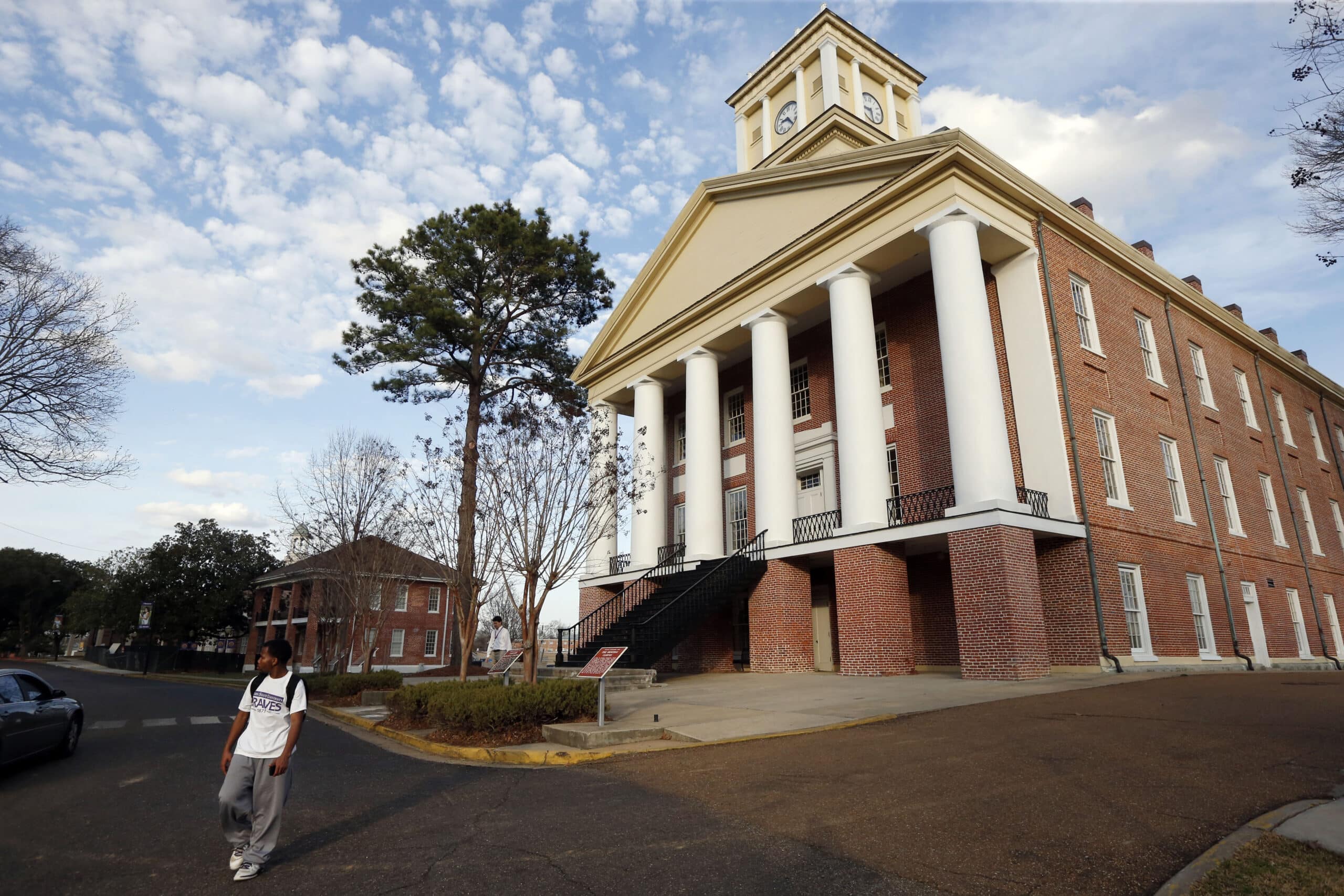Mississippi Today
‘A friend in a high place’: Alcorn State interim president could be latest internal hire by IHL

Alcorn State Univerity’s interim president appears to have at least some campus support if he wants the full appointment.
But if Mississippi’s public university governing board forgoes a national search and appoints Tracy Cook, it will mark the ninth time in 10 years that it has hired an internal candidate as a top leader.
One was a university president already. Some were acting or interim presidents when given the full appointment. Others had worked as commissioners within the Institutions of Higher Learning.

Cook, who was the vice president of student affairs when he was tapped as interim, did not respond to inquiries from Mississippi Today asking if he wants the job. But he has what it takes to bring life back to the waning campus, some students, faculty and alumni told members of the IHL Board of Trustees last week.
“The student body was given a questionnaire, and it was highly expressed that we would like Dr. Cook as our next president,” said Jordan Buck, the student government association president.
Some of IHL’s internal hires — like Nora Miller, who had served as Mississippi University for Women’s acting president, senior vice president for administration and chief financial officer before the board permanently appointed her the day of the listening sessions — have gone over without a hitch. But others have landed the board in hot water, sparking protests, accusations of favoritism and even bills to abolish IHL.
Just three presidents since 2014 have been hired from outside the state of Mississippi: Jeffrey Vitter at the University of Mississippi, Felecia Nave at Alcorn State and Daniel Ennis at Delta State University, who was appointed following a rare split vote. Nave, who IHL fired last year, was an Alcorn State alumnus.
Either way, IHL makes an unusually high number of internal hires for a public university system, said Judith Wilde, a George Mason University professor who studies presidential searches. She added internal hires are more common at private universities where presidents are often appointed on the strength of their connections.
“Having a friend in a high place who can help you is good for the candidate,” Wilde said. “I don’t know that it’s always the best for the institution.”
On the other hand, internal hires could mean that Mississippi’s universities are growing their own, which Bill Crawford, who served on the IHL board from 1992 to 2004, said is a sign of healthy institutions. He noted some of Mississippi’s most esteemed college presidents were internal hires, like Aubrey Lucas, who was president of Delta State before he led USM.
What makes the difference, Crawford said, is proper vetting. In Mississippi and across the country, university presidents are among the best-paid public officials.
“What you’re trying to do as a board is find the best person, and whatever means you can use to come up with that is what you oughta use,” he said.
John Sewell, IHL’s spokesperson, wrote in an email that the board’s goal is to find the right person for the position who can be prepared to lead on day one.
“Decisions of the Board are always made in the best interest of the institution,” he wrote.
IHL has not released a timeline for the Alcorn State search. At the listening sessions, Alfred Rankins, the commissioner and former Alcorn State president, said the board would decide what kind of search to conduct after hearing the community’s feedback.
When trustees meet for IHL’s regular board meeting later this week, they could likely discuss how to proceed during the executive session. Typically following the listening sessions, the board hires a headhunting firm and convenes a search committee of students, faculty, staff and alumni.
But even if IHL decides to conduct a national search, the board can change its mind.
IHL is constitutionally empowered to hire the university presidents, and board policies give trustees the authority to cut a search short at any time. That’s what happened in 2022, when IHL suspended its search to hire USM’s interim president, Joe Paul, after he received support during the listening sessions.
Paul’s appointment was largely applauded by faculty — including ones who had criticized IHL for empaneling a search committee with no rank-and-file faculty voices.
But at Jackson State University, IHL’s decision to name its deputy commissioner, Marcus Thompson, as president last year despite conducting a full-fledged national search drew ire.
At Alcorn State, Rankins, who was serving as deputy commissioner and had been acting president of Mississippi Valley State University, was an internal hire when he was appointed in 2014.
The following year, Cook came to Alcorn State to be Rankins’ chief of staff. Till then, Cook, an alumnus and one of Alcorn State’s best-ever football players, had spent his career working in various administrative levels in Jefferson and Claiborne county schools.
In 2018, Cook was promoted to interim vice president for student affairs, a position that came with a $20,000 pay bump. That same year, after Rankins became the IHL commissioner, Cook served on the advisory committee for IHL’s search for Rankins’ replacement.
In 2019, Cook was named vice president of student affairs permanently. He also oversaw enrollment management. Total enrollment at Alcorn State has fallen from 3,523 in fall 2019 to 2,894 in fall 2023, according to IHL and federal data.
Like Rankins, Cook is a member of the Alpha Phi Alpha fraternity, which may have more college presidents than any historically Black fraternity in the nation.
This article first appeared on Mississippi Today and is republished here under a Creative Commons license.![]()
Mississippi Today
MS House member agrees to pre-trial program after indictment
Rep. Keith Jackson, a Democratic lawmaker from Kemper County, can remain in office despite a felony indictment by participating in a pre-trial intervention program, according to court documents.
A grand jury last year indicted Jackson, a first-term House member, on charges of receiving stolen property – specifically, a 2006 Magnolia timber trailer worth about $15,000. The grand jury also indicted two other people, Fredwrick (sic) Young and William Tate, in connection with the criminal charges.
Jackson did not respond to a request for comment, and his attorney, Christopher Collins, declined to comment.
Cassie Colman, the district attorney in the 10th circuit district, told Mississippi Today that the state agreed to let Jackson participate in pretrial intervention because he had no prior criminal record. If Jackson completes the terms of the pre-trial agreement, then the criminal charges will be expunged from his record.
Going to trial would likely be risky for the lawmaker because, if convicted of the offense, he could lose the right to hold elected office.
Receiving stolen property is a disenfranchising crime in Mississippi, and if someone is convicted of a disenfranchising crime, they lose their right to vote. To run for office in Mississippi, someone must be a registered voter.
But Coleman, who prosecuted the case against Jackson, said the legislator’s agreement to enter the program is neither a guilty plea nor a conviction. Instead, he will enroll in the intervention program for at least a year and pay around $3,350 in fees, according to court documents.
If he fails to meet the terms of the agreement, the district attorney could remove him from the program and prosecute him for the original crime.
This article first appeared on Mississippi Today and is republished here under a Creative Commons Attribution-NoDerivatives 4.0 International License.
Note: The following A.I. based commentary is not part of the original article, reproduced above, but is offered in the hopes that it will promote greater media literacy and critical thinking, by making any potential bias more visible to the reader –Staff Editor.
Political Bias Rating: Centrist
The article presents factual information about a Mississippi House member’s legal situation, focusing on the details of the pre-trial intervention program and the potential consequences if he fails to meet the terms. There is no overt political commentary or slant, and it primarily reports on the legal process and actions taken by both the accused lawmaker and the prosecuting district attorney. The tone is neutral, and it avoids sensationalizing the case or making political judgments. Given the absence of opinion or partisanship, the content is categorized as centrist.
Mississippi Today
On this day in 1951, Ruby Hurley opened NAACP office in South
April 28, 1951

Ruby Hurley opened the first permanent office of the NAACP in the South.
Her introduction to civil rights activism began when she helped organize Marian Anderson’s 1939 concert at the Lincoln Memorial. Four years later, she became national youth secretary for the NAACP. In 1951, she opened the organization’s office in Birmingham to grow memberships in Alabama, Florida, Georgia, Mississippi and Tennessee.
When she arrived in Mississippi, there were only 800 NAACP members. After the governor made remarks she disagreed with, she wrote a letter to the editor that was published in a Mississippi newspaper. After that step in courage, membership grew to 4,000.
“They were surprised and glad to find someone to challenge the governor,” she told the Chicago Defender. “No Negro had ever challenged the governor before.”
She helped Medgar Evers investigate the 1955 murder of Emmett Till and other violence against Black Americans. Despite threats, she pushed on.
“When you’re in the middle of these situations, there’s no room for fear,” she said. “If you have fear in your heart or mind, you can’t do a good job.”
After an all-white jury acquitted Till’s killers, she appeared on the front cover of Jet magazine with the headline, “Most Militant Negro Woman in the South.”
Months later, she helped Autherine Lucy become the first Black student at the University of Alabama.
For her work, she received many threats, including a bombing attempt on her home. She opened an NAACP office in Atlanta, where she served as a mentor for civil rights leader Vernon Jordan, with whom she worked extensively and who went on to serve as an adviser to President Bill Clinton.
After learning of Evers’ assassination in 1963, she became overwhelmed with sorrow. “I cried for three hours,” she said. “I shall always remember that pool of blood in which he lay and that spattered blood over the car where he tried to drag himself into the house.”
She died two years after retiring from the NAACP in 1978, and the U.S. Post Office recognized her work in the Civil Rights Pioneers stamp series. In 2022, she was portrayed in the ABC miniseries, “Women of the Movement.”
This article first appeared on Mississippi Today and is republished here under a Creative Commons Attribution-NoDerivatives 4.0 International License.![]()
Note: The following A.I. based commentary is not part of the original article, reproduced above, but is offered in the hopes that it will promote greater media literacy and critical thinking, by making any potential bias more visible to the reader –Staff Editor.
Political Bias Rating: Centrist
This content is primarily focused on the historical and personal achievements of Ruby Hurley, a civil rights activist. It emphasizes her dedication and bravery in challenging oppressive systems and advocating for racial justice. The narrative does not appear to endorse or criticize any contemporary political positions but highlights Hurley’s work with the NAACP and her role in significant civil rights events. While it mentions her opposition to certain government figures and the threat she faced, the tone is largely factual and centered on her contributions to history, which supports a centrist position without leaning toward a particular ideological side.
Mississippi Today
Podcast: Mississippi citizens often left in the dark on special-interest lobbying of politicians
The post Podcast: Mississippi citizens often left in the dark on special-interest lobbying of politicians appeared first on mississippitoday.org
Note: The following A.I. based commentary is not part of the original article, reproduced above, but is offered in the hopes that it will promote greater media literacy and critical thinking, by making any potential bias more visible to the reader –Staff Editor.
Political Bias Rating: Center-Left
This content reflects a Center-Left bias primarily due to its focus on transparency issues regarding special-interest spending and lobbying in Mississippi. The mention of negative implications associated with lobbying efforts suggests an advocacy for accountability and reform, which aligns with a progressive stance often seen in Center-Left discourse. Additionally, the subject matter, involving regulation of online sports betting, typically garners support from more liberal perspectives concerned about consumer protection and ethical governance.
-

 SuperTalk FM6 days ago
SuperTalk FM6 days agoNew Amazon dock operations facility to bring 1,000 jobs to Marshall County
-

 News from the South - Missouri News Feed2 days ago
News from the South - Missouri News Feed2 days agoMissouri lawmakers on the cusp of legalizing housing discrimination
-

 News from the South - Alabama News Feed7 days ago
News from the South - Alabama News Feed7 days agoPrayer Vigil Held for Ronald Dumas Jr., Family Continues to Pray for His Return | April 21, 2025 | N
-

 News from the South - Florida News Feed6 days ago
News from the South - Florida News Feed6 days agoTrump touts manufacturing while undercutting state efforts to help factories
-

 News from the South - Florida News Feed6 days ago
News from the South - Florida News Feed6 days agoFederal report due on Lumbee Tribe of North Carolina’s path to recognition as a tribal nation
-

 News from the South - Oklahoma News Feed6 days ago
News from the South - Oklahoma News Feed6 days agoOklahoma Treasurer’s Office Faces Scrutiny Over Use of Signal in Anti-ESG Coordination
-

 Mississippi Today4 days ago
Mississippi Today4 days agoStruggling water, sewer systems impose ‘astronomic’ rate hikes
-

 Mississippi Today1 day ago
Mississippi Today1 day agoDerrick Simmons: Monday’s Confederate Memorial Day recognition is awful for Mississippians














































